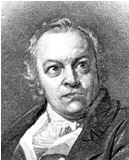Songs of Innocence and Experience by William Blake
Page 10 of 18 - 1 2 3 4 5 6 7 8 9 10 11 12 13 14 15 16 17 18 Purchase full notes for £5.95 (aprox $9.28)
Whereas innocence in Blake is receptive and yielding, experience is more dynamic, aiming at control and mastery. In that dynamism and energy, things are made , societies constructed, truths analysed. This is all positive: but the world of experience is also, fundamentally, one of bondage and fear. How can this be explained?
There are numerous examples to be found of the yielding , receptive quality of innocence in poems such as The Shepherd (where the shepherd follows the sheep) or The Ecchoing Green and Nurse’s Song (where adults listen to children and defer to them). There may be questions in Blake’s innocence , but they are always answered ( The Lamb ); there may be suffering, but it is always comforted and healed ( The Blossom , A Dream ): innocence means that the answers will be received, and that the comforting will be thankfully accepted. The pattern, here, is typically Romantic: the Innocent is the source of a child-like intuition, an understanding that may not be rationally demonstrable, but which sees, and actually experiences, a world of ‘Love Mercy Pity Peace’ nonetheless.
Wordsworth’s vision was full of regret that his child-like, intuitive, receptivity to nature faded in its power and intensity as he matured and entered the world of experience . For Blake, by contrast, the journey towards experience is both inevitable and essential. It is creative , for one thing: Blake’s ‘Tyger’ is a forged being – not so much a real tiger, as an imaginative creation of the poet. When someone passes through the gates of experience they start to make their own rules; they interpret the world in their own way. The child in A Little BOY Lost is a good example of someone ‘making their own meaning’ in this way:
There are numerous examples to be found of the yielding , receptive quality of innocence in poems such as The Shepherd (where the shepherd follows the sheep) or The Ecchoing Green and Nurse’s Song (where adults listen to children and defer to them). There may be questions in Blake’s innocence , but they are always answered ( The Lamb ); there may be suffering, but it is always comforted and healed ( The Blossom , A Dream ): innocence means that the answers will be received, and that the comforting will be thankfully accepted. The pattern, here, is typically Romantic: the Innocent is the source of a child-like intuition, an understanding that may not be rationally demonstrable, but which sees, and actually experiences, a world of ‘Love Mercy Pity Peace’ nonetheless.
Wordsworth’s vision was full of regret that his child-like, intuitive, receptivity to nature faded in its power and intensity as he matured and entered the world of experience . For Blake, by contrast, the journey towards experience is both inevitable and essential. It is creative , for one thing: Blake’s ‘Tyger’ is a forged being – not so much a real tiger, as an imaginative creation of the poet. When someone passes through the gates of experience they start to make their own rules; they interpret the world in their own way. The child in A Little BOY Lost is a good example of someone ‘making their own meaning’ in this way:
Nought loves another as itself
Nor venerates another so
Nor is it possible to Thought
A greater than itself to know:

